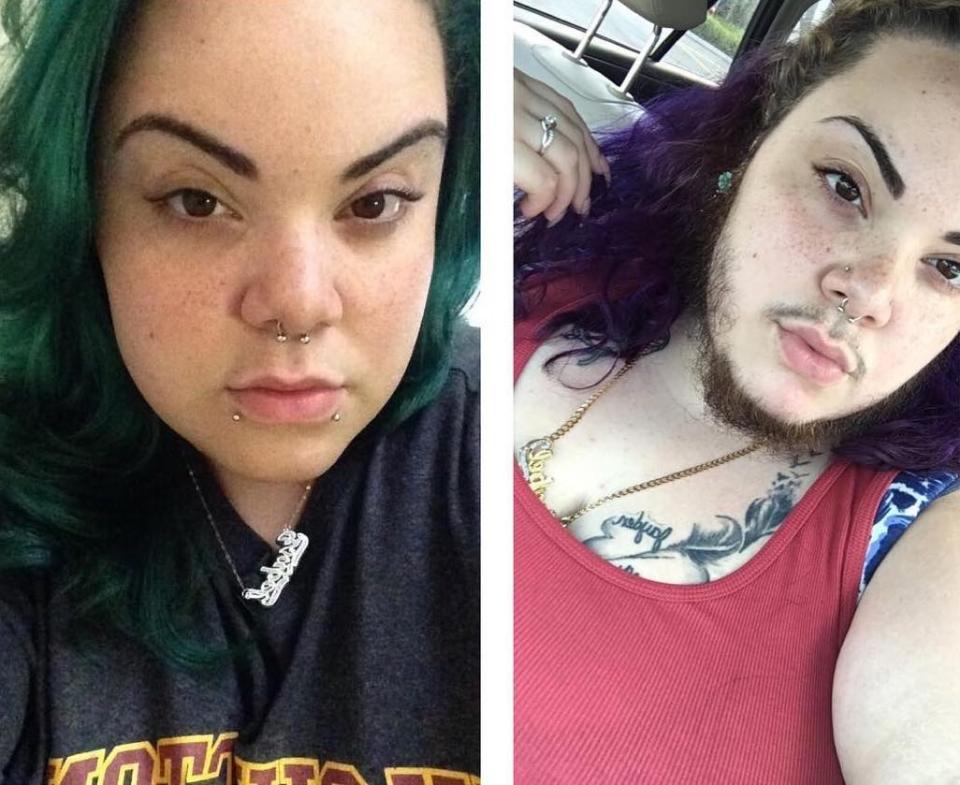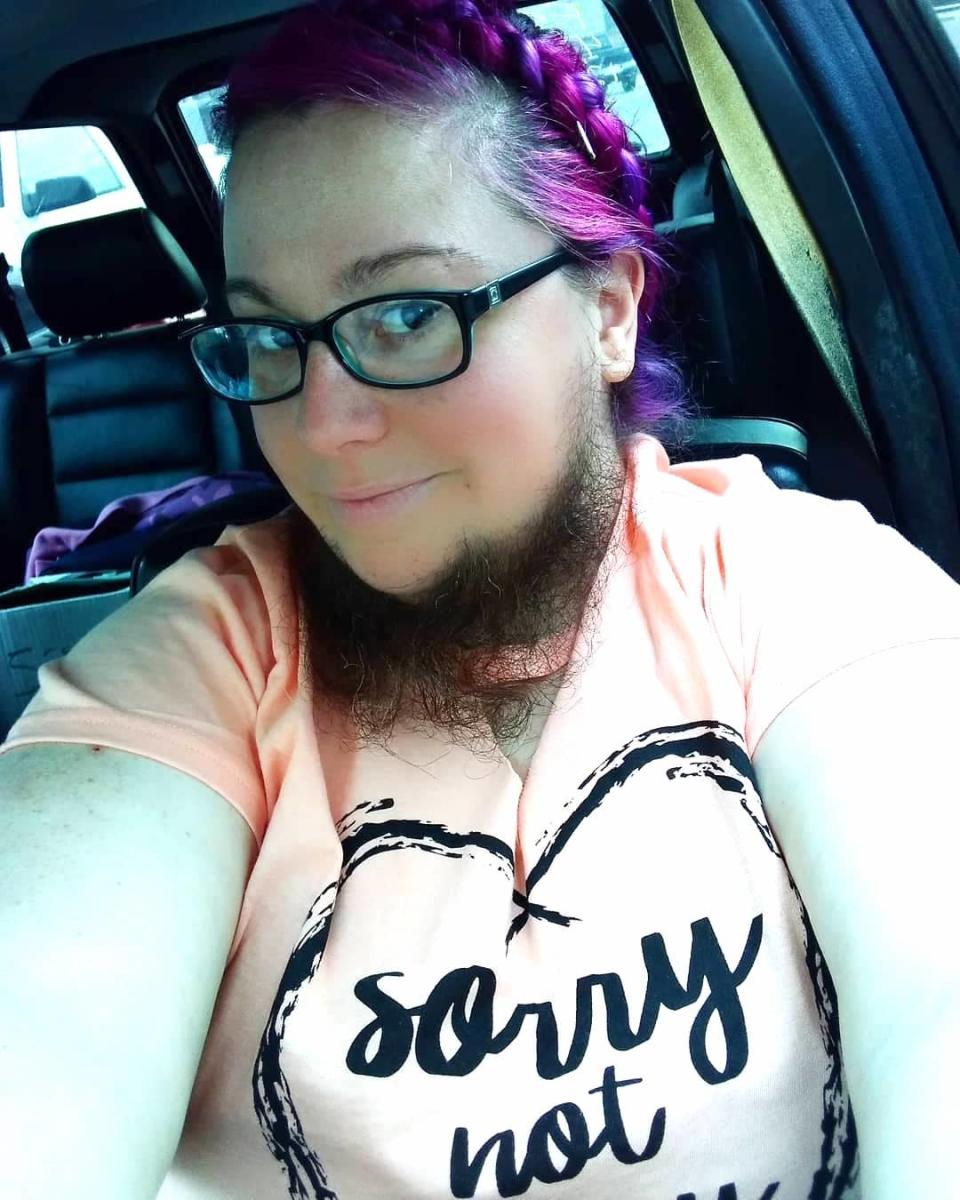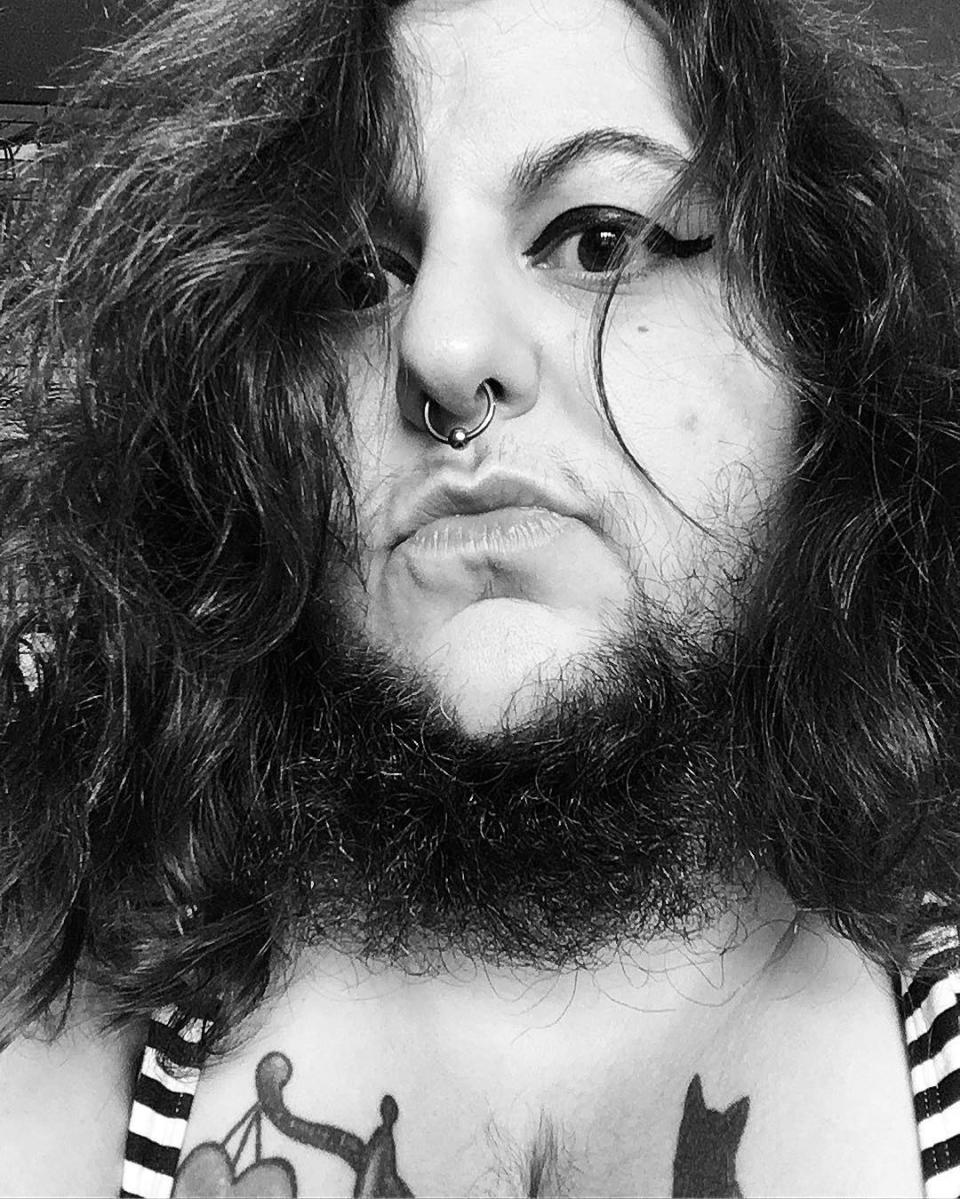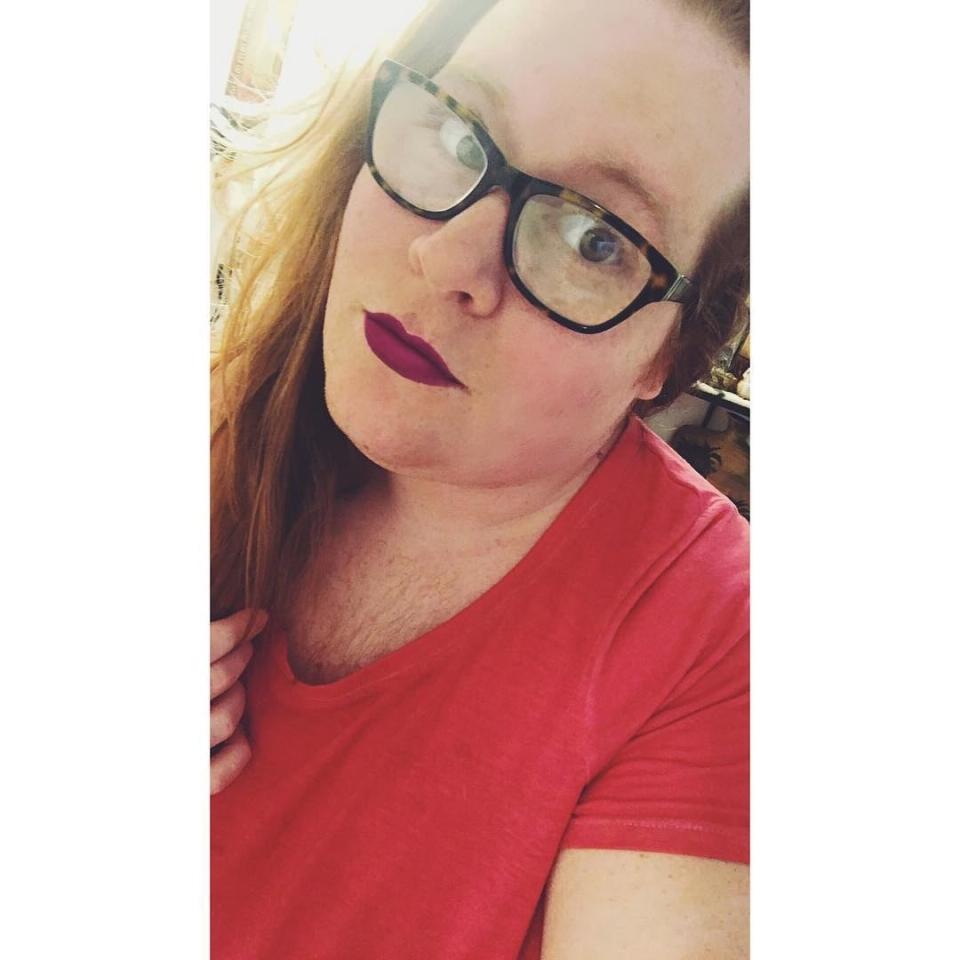5 Women With PCOS Explain Why They Choose to Celebrate Their Facial Hair
Women with visible facial hair have often been treated like sideshow attractions, attracting curiosity and ridicule even when not performing in an actual 19th-century carnival. But facial hair, like all body hair, is completely natural. Some women simply have more of it than others, whether they're trans or dealing with a hormonal health condition like polycystic ovary syndrome (PCOS). (Hirsutism, in which lots of hair grows where it otherwise might not, is one of PCOS's most common symptoms.)
And while beauty standards have traditionally dictated that women's faces should be hairless to be attractive, many women are now actively embracing their beards and mustaches as part of their identities. Model and activist Harnaam Kaur, who holds a Guinness World Record as the youngest woman to grow a full beard, is a pioneer in this movement, sending out frequent messages of body positivity to her 112,00 Instagram followers.
She's not the only one using her platform to educate the world about hirsutism and fight the stigma that surrounds it. Allure recently spoke with five women dealing with PCOS about their decisions to embrace their facial hair and show the world its beauty. Alma Torres, for example, tells Allure that after shaving her beard for years, she made it a part of her look and now feels more confident than ever; Adriana Javier, meanwhile, views growing out her facial hair grow as "a big middle finger" to repressive societal norms. While the body positivity movement has gathered momentum in recent years, hair on female faces has been largely left out of the conversation. And although there's no one "right" way to feel about your body, these women prove that not only is female facial hair natural, it's worth celebrating.
Alma Torres, 25

Alma Torres with and without facial hair
Courtesy of Alma TorresI noticed I had facial hair at a young age, maybe around nine or 10, but it never bothered me because I was focused on being a kid. I grow facial hair due to polycystic ovary syndrome. I removed my sideburns, which were really thick and dark, for my eighth-grade prom. In 2009, when I was working with children, I decided to bleach my mustache. That didn't work, so by the end of the summer, I started to shave instead.
The moment I decided to let my facial hair grow out was August 11, 2016. It was something I had to mentally and emotionally prepare myself for; I'd been wanting to do it for so long. I can honestly say that growing my facial hair was the best decision I ever made. I absolutely love my beard. It's given me the confidence I never thought I would have.

Alma Torres
Courtesy of Katie McCurdyPeople's reactions to me as a bearded woman are sometimes humorous. I've had people make side comments to whoever they're with...I've had people say, "Yo, she has a full beard" as I walk past, or "What is that?" But I've also gotten positive reactions, like: "Your beard looks really dope" or "You are sure rocking that beard, girl. Don't change."
I fell in love with what I couldn't change about myself.
I want people to know that my beard is due to my condition, but I do not regret it one bit. I fell in love with what I couldn't change about myself. I love myself a little more than I did before, and it's OK to be different from everyone else. We were born to stand out. Change for no one but yourself.
Annalisa Hackleman, 33

Annalisa Hackleman
Courtesy of Annalisa HacklemanMy mom noticed hair growing on my chin and neck around 12 years old. I really don't remember having a reaction, but my mom made a huge deal about it. I was diagnosed at a young age with PCOS. I have done a lot to rid myself of "unwanted facial hair," starting with laser hair removal at 12 or 13... It was painful and expensive and did not work, as happens with most people who have an endocrine or hormonal disorder like I do. I have shaved most of my life, waxed, threaded, sugared and plucked.
When I was last shaving regularly, I was shaving three to four times a day. A few years ago I was not in a good place mentally: I would only leave the house for work and I spent hours plucking and shaving, to no avail. It felt like there was no end. My husband was trying his best to help me, even doing whatever he could to make me feel beautiful. He would wax my face and pluck for me while we lay in bed. It never ended. One day, after one of my meltdowns, he asked me: Why not just stop, give my face a rest, and let the hair just grow?

Annalisa Hackleman image 2
Courtesy of Annalisa HacklemanWith my husband's support, I felt a little more empowered. I'd go several days, then shave, then go a few more days, with longer and longer breaks. My last day of shaving my face completely was July 25, 2014. It took a long time to feel confident. I have shaved since, and I do remove hair on my face occasionally, but I live with a full beard. I feel like I am finally myself. I dress differently since I don't have weird rules anymore, like not wearing white because I thought people would notice my 5 o'clock shadow more, and I dress more feminine because I don't mind being noticed.
Reactions vary depending on where I go and who I am with or even the gender of the person observing me. Women tend to touch their faces a lot when they see me out in public like they're feeling for their hair. Men often are in shock or awe and tend to ask questions or give kudos. I have received death threats, overheard people wondering if I was transitioning, had doctors approach me to ask questions or even take photos to show patients.
Other people can't decide what's right for you. You don't need anyone's approval for your body.
The biggest thing I want people to take away from my story is that you can empower yourself — you don't have to be a slave to something you hate. If you hate the hair, remove it, or flip it and learn to love it. Whatever you choose to do, remember that other people can't decide what's right for you. You don't need anyone's approval for your body.
Little Bear Schwarz, 35

Little Bear Schwarz
Courtesy of Little Bear SchwarzI started developing facial hair when I was around 14 or 15, with it being necessary to shave daily by 16. Because so many doctors at that time didn't have a proper understanding of how to diagnose it, it wasn't until I was almost 32 — nine months after letting my beard grow — that I finally found a doctor who was able to clearly see I have polycystic ovary syndrome.
I shaved my face, neck, and chest in the shower so I wouldn't have to watch myself do it.
From ages 16 to 31, I shaved my face, neck, and chest in the shower every day so that I wouldn't have to watch myself do it. The shame was that internalized. In my 20s, I started reading more about feminism and body autonomy, but I still was afraid of growing my hair. On a practical level, who would hire me? Who would date me? How could I safely navigate the world as a bearded woman?

Little Bear Schwarz
Courtesy of Little Bear SchwarzI was weeks shy of my 31st birthday when I started my life over, packed my entire life into a suitcase, and bought a one-way ticket to Seattle... I realized this would be the best time to give it a shot. If it was too scary, I could always shave and say, "At least I tried." Within weeks, I entered a beard competition, won first place, used the networking to start up a performance career, and suddenly had a platform as a public figure. Keeping my beard became not just possible, but lucrative. I haven't shaved since April of 2014.
When I first started growing my beard out, I still wrestled with how to reconcile being a woman and being bearded. At first, I tried eschewing femininity altogether, opting instead for a more "androgynous" look with half a shaved head, undershirts, and jeans. But the more confidence I gained, the more I realized that that's not who I was and that owning my femininity along with my beard would be not just more radical, but more rewarding long term. It's no longer something I see as a "subversion" of femininity; now, it’s the crowning glory of my femininity.
Bearded women aren't punchlines. We are as real, valid, beautiful, and worthy of dignity as anyone else.
Women who keep their facial and body hair are seen as doing womanhood "wrong." I want them to know that no one aesthetic or size or shape is gatekeeping femininity. I want people to know bearded women exist. We aren't punchlines. We are as real, as valid, as beautiful, and as worthy of dignity as anyone else. My goal is that one day women won't have to justify keeping their beards. They won't have to label themselves as "bearded women." They'll just be women.
Miranda Nodine, 28

Miranda Nodine
Courtesy of Miranda NodineI started developing facial hair and body hair when I was in middle school. I felt confused because as a child growing up, you really only see facial hair on men. I grow facial hair and body hair because of hirsutism, which in my case is caused by PCOS. There's much more about that condition that causes me to feel like my body is waging a war against me. I'm exhausted all the time and I have extremely irregular or nonexistent periods, just to name a few things.
I still remove my hair most of the time, but it's not as crucial as it used to be. Shaving is not an everyday thing right now, but I'm extremely open and proud of my stubble just the way it is.

Miranda Nodine image 2
Courtesy of Miranda NodineI'm so excited for some "hairy-faced" opportunities in the future, and that wasn't ever the case until I embraced my body hair this past year. My fiancée's brother does beard competitions and I would love to join or at least try. But if that doesn't work out, I want to grow my mustache out and dye it funky colors or twist it into fun shapes.
Loving yourself for who you are is liberating, and I wish I could've started sooner.
Hair on my face and body doesn't make me masculine. It makes me a female who just happens to have body and facial hair. I have a beautiful fiancée who loves me with or without facial hair and body hair, and I have amazing friends. Loving yourself for who you are is liberating, and I wish I could've started sooner. Life's too short to hide your natural self.
Adriana Javier, 30

Adriana Javier
Courtesy of Adriana JavierI've always had hair on my upper lip. My dad would say that it was just genetics and that my lola [Tagalog for grandma] had one, too. The hairs on my chin started to come in when I was about 20. At first, it was just one or two hairs on my chin that I would pluck. However, over the next couple of years, more started to grow, and that was disconcerting. I was a young, fat woman who hadn't come out as queer yet, who was trying to date, and I was really insecure about the facial hair and my acne and my fatness.
I ended up going to my doctor and told her about the hair and she mentioned that it could be PCOS. I didn't follow up with a full diagnosis for that until many years later, but I remember being frustrated that this was happening and feeling that I would never be beautiful or feminine. I've plucked my hair, threaded it, waxed it, Naired it, shaved it, and contemplated laser hair removal and electrolysis to get rid of it permanently. I was also put on spironolactone, a blood pressure medication which inhibits the hormone aldosterone, but it never reduced the growth.
I remember feeling that I would never be beautiful or feminine.
I came to embrace it and flaunt it more after I came out as queer just under a year ago. Prior to coming out, I was always concerned about presenting as femininely as possible and with being attractive to cisgender heterosexual men. Coming out has upended my ideas about gender presentation; while I use she/her pronouns and am a cis woman, I actively shun the idea that gender is binary and that I have to perform femininity in a particular way. I am a woman, I have a beard, and that is just fucking fine.
The second time I was put on spironolactone about four years ago, I remember crying because I felt like I could never be beautiful or attractive to anyone because of my facial hair. I sat on my couch sobbing, feeling completely and utterly worthless, all because of some hair that I had been conditioned to believe did not belong on my body. But it does belong on my body.
I am a woman, I have a beard, and that is just fucking fine.
Keeping my beard, in my mind, is a big middle finger to a society and system that has marginalized those of us who do not conform, and I want to be unabashed and visible in my nonconformity so that I can help make space for others like me. I am glad that I have found the courage to move past my shame, and I am even more grateful for the amazing people in my life who have loved me and affirmed me as I am, beard and all.
Read more stories about people's relationships with their hair and bodies:
7 Women and Femmes Pose for Beautiful Portraits of Their Arm Hair
We Asked Six Women to Bare Their Cellulite, and the Results Are Breathtaking
Now, watch girls ages five to 18 share what beauty means to them:


